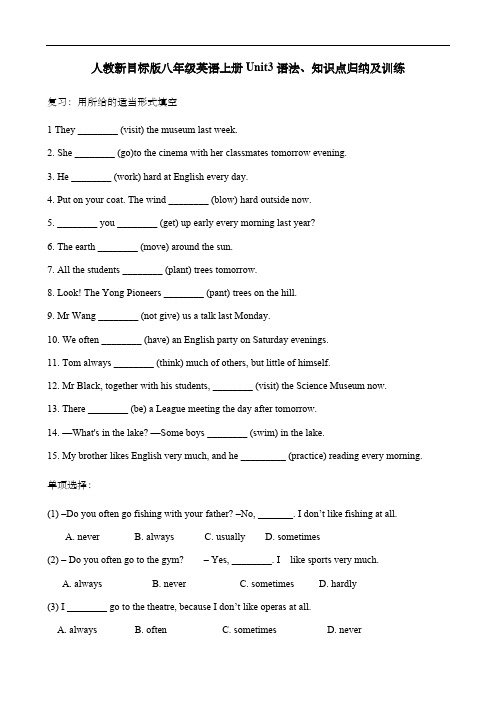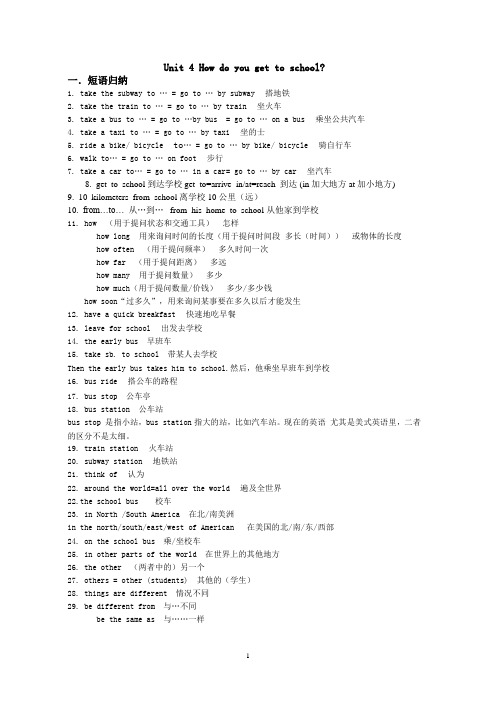人教版新目标八年级上册-英语语法知识及练习
新目标八年级上册英语词汇语法专练及答案

新目标八年级上册英语词汇语法专练一、根据句意及首字母提示完成单词。
1.Don't l at that old man. It’s not polite(礼貌的).2.Call English Study Center at the telephone number for more i if you want to know more.3.He is not funny, and he is always very s .4.-What does your little brother do? -He is a p school student.5.Health is very important. It is n for us to exercise every day.6.My twin brother is more o than me.7.Liu Gang joined the a when he was 20 years old.8.The boy couldn’t find his mother, so he cried as l as he could.9.The question is pretty s .I’m sure he can answer it.10.You didn't come to the party, can you tell me the r ?11.He was from a p mountain village and he had no money for school.12.He told his parents his ideas about the camping several times, but theyd with him at last.13.Lucy was so u that she lost her wallet.14.David studies very hard, so he always gets good g in tests.15.Li Ming is nine years old and he studies in a p school.16.I told you to clean the room, you didn’t clean it, (可是).17.His sister didn't do well in the singing c (比赛).18.The little boy is very smart but not (工作努力的).19.Grace is three years old and she can speak (清楚地).20.It is (必要的) for as to exercise every day.21.The British teacher is very humorous. He always tells us (笑话).22.He is good at many things and he is a (有才能的) person.23.These are two (票)for the concert this evening. Can you go with me?24.My English teacher is always (准备好的) with advice for our study and life.25.I think it is a really (有教育意义的) movie.26.Li Lei is more (外向的) than Lin Tao.27.He is a (辛勤的) boy.28.We can get some useful (信息) on the Internet.29.He (赢得) a beautiful notebook in the English contest.30.It's (必要的;必需的) for kids to do more housework at home.二、用所给单词的适当形式填空。
(新版)新目标英语八年级上册Unit03语法知识点

Unit 3 I’m more outgoing than my sister.Section A (1a —Grammar Focus)● 1.“Is this/that …?”用于交际场合,尤其是互相介绍和询问时,this和that指“这位”“那位”或“这个人”“那个人”。
—Is this Miss Wang?—Yes, it is.2. this/that还用于电话用语中,在打电话时问“你是……吗?”用“Is that …?”,回答“我是……”用“This is…(speaking).”—Is that Li Lei?—No, this is Li Ping (speaking).●Sam has longer hair than Tom = Sam’s hair is longer than Tom’s(=Tom’s hair,不能用Tom,只能同类事物相比较).● 1. Both…and…“……两者都”,连接名词或代词作主语,其后的谓语动词用复数形式,其否定形式可为“neither…nor…”。
Both you and I are in Class Five.否定形式:Both you and I aren’t in Class Five. 我和你不都在5班。
(不完全否定)Neither you nor I am (就近原则) in Class Five. 我和你都不在5班。
(完全否定)2. pron./adv. both(两者)否定为:neither(两者中)任何一个不all(三者或三者以上)否定为:none(三者或三者以上)没有人或没有物。
All of them are English. = They are all English. 他们都是英国人。
否定:None of them is (are) English. 他们都不是英国人。
Both of them are doctors. = They are both doctors. 他们俩都是医生。
新目标八年级上册_英语语法知识点精讲+练习

新目标八年级上册英语语法知识点精讲+练习(一)一般将来时一般将来时表示将来某个时间要发生的动作或者存在的状态。
通常与表示将来的时间状语连用,如tomorrow, the day after tomorrow, next year, next month, next week, in 100 years等。
be going to do(动词原形)结构:表示打算、准备做的事情或者肯定要发生的事情。
如:It is going to rain.will do结构表示将来的用法:1. 表示预见Do you think it will rain?You will feel better after a good rest.2. 表示意图I will borrow a book from our school library tomorrow.What will she do tomorrow?基本构成如下:一般疑问句构成:(1)will+主语+do…? Will Sarah come to visit me next Sunday?(2)there be 结构的一般疑问句:Will there + be …?Will there be fewer trees? Yes, there will. / No, there won’t否定句构成:will + not (won’t)+doSarah won’t come to visit me next Sunday.特殊疑问句构成:特殊疑问词+will+主语+…?What will Sarah do next Sunday?★★练一练★★根据例句,用will改写下列各句例:I don’t feel well today. (be better tomorrow)I’ll be better tomorrow.1. Gina has six classes today. (have a lot of homework tonight)_____________________________2. I’m tired now. (sleep later)_____________________________3. My parents need a new car. (buy one soon)_____________________________4. We can’t leave right now. (leave a little later)_____________________________5. The weather is awful today. (be better tomorrow)_____________________________答案:1. She’ll have a lot of homework tonight.2. I’ll sleep later.3. They’ll buy one soon.4. We’ll leave a little later.5. Maybe it’ll be better tomorrow.(二)should的用法:should用来提出建议和忠告,后边加动词原形,否定句直接在should后边加not.例如:I think you should eat less junk food.我认为你应该少吃垃圾食品。
新人教新目标版八年级英语上册短语语法知识点汇总

人教版八年级英语上册短语语法知识点总结初二英语课组2019年[由我校初二英语科组根据最新考纲和近几年中考的趋势加上我校学生的实际情况,结合初二全体英语科组的力量,汇编了这一份重点总结,编好一份学案不易,望同学们能好好利用。
]Unit 1 Where did you go on vacation一、必背单词短语。
Section A1.Where did you go on vacation? (P. 1)on vacation意为“在度假”,结构“on+名词”表示“在某种状态中”。
例句:My family went to Hainan on vacation last year.2....visited my uncle (P. 1)visit此处用作及物动词,后接人或物做宾语,意为“拜访、看望”,后接表示地点的名词,意为“参观、游览”。
例句:I visited my grandmother last week.例句:Do you want to visit Shanghai?3....go with anyone? (P. 2)(1)anyone用作不定代词,意为“有人、任何人”,相当于anybody,用于疑问句和否定句中,在肯定句中用someone或者somebody。
但是anyone也可以用在肯定句中,表示“任何一个人”。
例句:Did you meet anyone friendly in that city?例句:Anyone can be helpful in some way.(2)anyone只能指人,不可以指物,后面不接of短语;any one既可以指人也可以指物,后可接of短语。
例句:You can ask any one of us about this question.4....buy anything special? (P. 2)(1)buy用作双宾语动词,表示“买”,常用的结构为“buy sb. sth.”或者“buy sth. for sb.”,表示“为某人买某物”。
人教新目标版八年级英语上册Unit3语法、知识点归纳及训练

人教新目标版八年级英语上册Unit3语法、知识点归纳及训练复习:用所给的适当形式填空1 They ________ (visit) the museum last week.2. She ________ (go)to the cinema with her classmates tomorrow evening.3. He ________ (work) hard at English every day.4. Put on your coat. The wind ________ (blow) hard outside now.5. ________ you ________ (get) up early every morning last year?6. The earth ________ (move) around the sun.7. All the students ________ (plant) trees tomorrow.8. Look! The Yong Pioneers ________ (pant) trees on the hill.9. Mr Wang ________ (not give) us a talk last Monday.10. We often ________ (have) an English party on Saturday evenings.11. Tom always ________ (think) much of others, but little of himself.12. Mr Black, together with his students, ________ (visit) the Science Museum now.13. There ________ (be) a League meeting the day after tomorrow.14. —What's in the lake? —Some boys ________ (swim) in the lake.15. My brother likes English very much, and he _________ (practice) reading every morning.单项选择:(1) –Do you often go fishing with your father? –No, _______. I don’t like fishing at all.A. neverB. alwaysC. usuallyD. sometimes(2) – Do you often go to the gym? – Yes, ________. I like sports very much.A. alwaysB. neverC. sometimesD. hardly(3) I ________ go to the theatre, because I don’t like operas at all.A. alwaysB. oftenC. sometimesD. never(4) He says he will come to see us tomorrow afternoon.A. sometimeB. some timeC. sometimesD. some times(5) Speak aloud, please! I can _____ hear you.A. almostB. hardlyC. usuallyD. sometimes(6) My cousin wants to keep slim. She does exercise every morning and __ eats meat.A. hardlyB. alwaysC. usuallyD. often(7) —Miss Zhou is very popular with the students.—Yes. Her classes are_________ lively and interesting.A. alwaysB. sometimesC. hardlyD. never(8) —Have you ever been to Disneyland?—No, ______.I hope I can go there next year.A. alwaysB. sometimesC. neverD. often(9) —Zhang Lili, "the most beautiful teacher", has moved us deeply.—Yes, and she is__________ popular with her students.A. sometimesB. neverC. alwaysD. hardly(10) I don’t think fast food is good for our health, so I _______ go to MacDonald.A. hardlyB. alwaysC. usuallyD. often语法学习:形容词是用来修饰名词或不定代词,说明事物和人的性质和特征的一类词,在句子中用作定语、表语、宾语补足语;而副词用以修饰动词、形容词或其他副词,在句子中作状语、表语、补语和定语。
(人教版新目标)八年级英语上册全册各单元知识点期末总复习讲解教学课件

3. feel like “感受到;摸起来”,后跟宾语 从句或名词。 I felt like I was a bird. 我感觉我是一只鸟。 It feels like a stone. 它摸起来像一块石头。
eg.something special; somewhere wonderful. 2.不定代词做主语时,谓语动词用第三人称单数。 eg.Is everybody here? 大家都到齐了吗?
1. get to/reach/arrive 都是“到达“的意思。
get to+sp=reach+sp = arrive at+sp(小)=arrive in+sp(大) 若他们后面要加地点副词here, there, home等,则 不需要加介词。
25、up and down上上下下 26、come up出来 27、enjoy oneself=have fun=have a good time
玩的开心
二、重要句子(语法):
1.Where did you go on vacation? 你到哪里去度假了?
I went to New York City. 我去了纽约城。
三、习惯用法、搭配
1. buy sth. for ab./ buy sb. sth. 为某人买某物 2. taste + adj. 尝起来…… 3. nothing to do but do除了……之外无事可干 4. seem + (to be) + adj 看起来 5. arrive in + 大地方 / arrive at + 小地方 到达某地 6. decide to do sth=make a decision决定做某事 7. try doing sth. 尝试做某事
人教新目标八年级英语上册1-4单元语法点总结

Unit 4 How do you get to school?一.短语归纳1. take the subway to …= go to … by subway搭地铁2. take the train to …= go to … by train坐火车3. take a bus to …= go to …by bus= go to … on a bus乘坐公共汽车4. take a taxi to …= go to … by taxi坐的士5. ride a bike/ bicycle to…= go to … by bike/ bicycle骑自行车6. walk to…= go to … on foot步行7. take a car to…= go to … in a car= go to … by car坐汽车8. get to school到达学校get to=arrive in/at=reach 到达 (in加大地方at加小地方)9. 10 kilometers from school离学校10公里(远)10. from…to…从…到…from his home to school 从他家到学校11. how(用于提问状态和交通工具)怎样how long用来询问时间的长度(用于提问时间段多长(时间))或物体的长度how often(用于提问频率)多久时间一次how far(用于提问距离)多远how many用于提问数量)多少how much(用于提问数量/价钱)多少/多少钱how soon“过多久”,用来询问某事要在多久以后才能发生12. have a quick breakfast快速地吃早餐13. leave for school出发去学校14. the early bus 早班车15. take sb. to school 带某人去学校Then the early bus takes him to school.然后,他乘坐早班车到学校16. bus ride搭公车的路程17. bus stop 公车亭18. bus station 公车站bus stop 是指小站,bus station指大的站,比如汽车站。
英语八年级上册Units 1-2语法归纳同步练习-人教版(新目标)

初二英语上册Units 1-2语法归纳同步练习(答题时间:40分钟)微课程:不定代词(上册Units 1-2语法归纳)同步练习I. 选词填空1. You must do carefully. (something, everything)2. Granny Liu has rice now. Let’s buy _______________ forher. (little, a little, some)3. I am off duty today. Give me to read. (everything,something)4. They all came to the playground for morning exercises. of them were late. (neither, none)5. My sister gave me two pictures. One is the Great Wall, is the Ming Tombs. (another, other, the other)6. He asked for money and I gave him . (some, any)7. Did you eat at supper time? (much, many)8. If calls, tell him I am busy. (anyone,someone)9. Is ___________________ here today? (everyone; someone)II. 根据汉语意思完成下列句子1. 太阳总是从东方升起。
The sun ______________________ rises in the east.2. 我弟弟从不努力学习。
My brother ___________________ studies hard.3. 吉姆通常十二点睡觉。
- 1、下载文档前请自行甄别文档内容的完整性,平台不提供额外的编辑、内容补充、找答案等附加服务。
- 2、"仅部分预览"的文档,不可在线预览部分如存在完整性等问题,可反馈申请退款(可完整预览的文档不适用该条件!)。
- 3、如文档侵犯您的权益,请联系客服反馈,我们会尽快为您处理(人工客服工作时间:9:00-18:30)。
人教版新目标八年级上册英语语法知识点精讲+练习(一)一般将来时一般将来时表示将来某个时间要发生的动作或者存在的状态。
通常与表示将来的时间状语连用,如tomorrow, the day after tomorrow, next year, next month, next week, in 100 years等。
be going to do(动词原形)结构:表示打算、准备做的事情或者肯定要发生的事情。
如:It is going to rain.will do结构表示将来的用法:1. 表示预见Do you think it will rain? You will feel better after a good rest.2. 表示意图I will borrow a book from our school library tomorrow.What will she do tomorrow?基本构成如下:一般疑问句构成:(1)will+主语+do…? Will Sarah come to visit me next Sunday?(2)there be 结构的一般疑问句:Will there + be …?Will there be fewer trees? Yes, there will. / No, there won’t否定句构成:will + not (won’t)+doSarah won’t come to visit me next Sunday.特殊疑问句构成:特殊疑问词+will+主语+…?What will Sarah do next Sunday?根据例句,用will改写下列各句例:I don’t feel well today. (be better tomorrow)I’ll be better tomorrow.1. Gina has six classes today. (have a lot of homework tonight)_____________________________2. I’m tired now. (sleep later)_____________________________3. My parents need a new car. (buy one soon)_____________________________4. We can’t leave right now. (leave a little later)_____________________________5. The weather is awful today. (be better tomorrow)_____________________________答案:1. She’ll have a lot of homework tonight.2. I’ll sleep later.3. They’ll buy one soon.4. We’ll leave a little later.5. Maybe it’ll be better tomorrow.(二)should的用法:should用来提出建议和忠告,后边加动词原形,否定句直接在should后边加not.例如:I think you should eat less junk food.我认为你应该少吃垃圾食品。
She drives a lot and she seldom walks. So I think she should walk a lot.她经常开车,很少走路。
所以我认为她应该多走路。
Students shouldn’t spend too much time playing computer games.学生们不应当花太多的时间玩计算机游戏。
学习向别人提建议的几种句式:(1)I think you should…(2)Well, you could…(3)Maybe you should …(4)Why don’t you…?(5)What about doing sth.?(6)You’d better do sth.用should或shouldn’t填空1. I can’t sleep th e night before exams.You ______ take a warm shower before you go to bed.2. Good friends ______ argue each other.3. There is little milk in the glass. We _______ buy some.4. They didn’t invite you? Maybe you ______ be friendlier.5. I am a little bit overweight. So I think I _______ do exercises every day.答案:1. should 2. shouldn’t 3. should 4. should 5. should(三)过去进行时过去进行时表示过去某一点时间正在进行的动作或者过去某一段时间内一直进行的动作。
1. 构成was /were + doing,例如:I was watching TV at 9 o’clock last night.at 9 o’clock last night是时间点They were playing football all afternoon.all afternoon是时间段2. 过去进行时的标志词at 8 o’clock last night, this time yesterday等。
例如:I was having lunch at home this time yesterday. 昨天的这个时候我正在吃午饭。
At that time she was writing a book. 那阵子她在写一本书。
(表示她在那段时间里一直在做那件事情。
)练习用括号中所给动词的适当形式填空。
1. This time yesterday I ____ ______(read)books.2. At 9 o’clock last Sunday they ______ ______(have)a party.3. When I _____(come)into the classroom, she ________ ______(read)a storybook.4. She _____ ______(play)computer games while her mother ____ ______(cook)yesterday afternoon.5. I _____ ______(have)a shower when you _______(call)me yesterday.答案:1. was reading 2. were having 3. came; was reading 4. was playing; was cooking 5. was having; called (四)间接引语形成步骤:(1)不要逗号,冒号,引号(2)要考虑到人称的变化(人称的变化与汉语是一致的)(3)要考虑时态的变化(4)要考虑时间状语、地点状语和语示代词的变化。
1.2.★★练一练★★用括号中所给动词的适当形式填空。
1. She said I _____(be)hard-working.2. Peter told me he _____(be)bored yesterday.3. She said she _____(go)swimming last Sunday.4. Bobby said he _____(may)call me later.5. Antonio told me he _____(read)a book then.答案:1. was 2. was 3. went 4. might 5. was reading请转述他人说的话:1. I go to the beach every Saturday. (Tom)2. I can speak three languages. (Lucy)3. I will call you tomorrow. (Mike)4. I’m having a surprise party for Lana. (she)(五)if引导的条件状语从句结构:if+一般现在时,主语+将来含义:如果……,将要……例如:If you ask him, he will help you. 如果你请求他,他会帮助你。
If need be, we’ll work a ll night. 如果需要,我们就干个通宵。
★★练一练★★根据中文提示,完成句子。
1. 如果你参加聚会,你将会过得很开心。
If you ________ the party, you __________.2. 如果明天下雨,我们将不去野餐。
If it __________ tomorrow, we ___________.3. 如果你经常听英文歌,你将会喜欢英语的。
If you often ________, you _________________.答案:1. If you go to the party, you will have a good time2. If it rains tomorrow, we won’t go to the picnic3. If you often listen to English songs, you’ll like English二. 完形填空特点及解题思路(一)题型分类与特点完形填空试题是在给出的一篇短文中有目的地拿掉若干个词,留下一些空格,要求考生借助短文保留的部分,从所给的短文整体出发,在正确理解短文意思的基础上,根据句子和句子间的内在联系、词的用法和习惯搭配等,用适当的词或词语填空,使补全后的短文意思通顺、前后连贯、结构完整。
这种题型测试的内容从形式上看是单词或短语的填空,但它必须注意到短文中上、下文意思连贯、词语搭配和语法结构正确,所以在空格上所填的词必须符合语义适用和语法正确两条原则,只考虑某一侧面都可能导致错误。
中考中完形填空试题的基本题型分两类:完形填空选择题和完形填空题。
1. 完形填空选择题:该题型的特点是将一篇短文中若干词语抽掉留下空格,对每一空格提供若干个选择项,要求考生通读短文后,在理解短文意思的基础上,运用所学的词汇、句型、语法等语言知识,从所提供的备选项中选出一个最佳答案,使短文内容完整正确。
